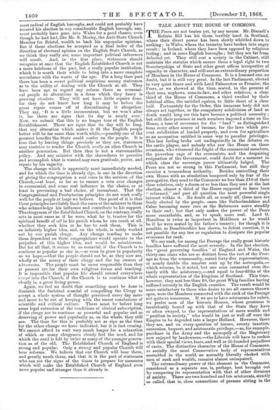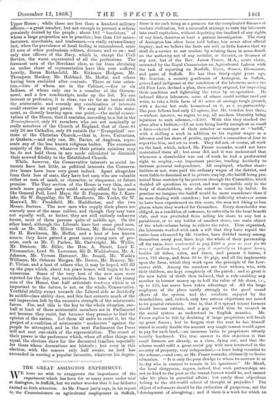TALK ABOUT THE HOUSE OF COMMONS. T HE Peers are not
beaten yet, by any means. Mr. Disraeli's Reform Bill has hit them terribly hard in Scotland, where their direct power has been slowly whittled down to nothing ; in Wales, where the tenantry have broken into angry revolt ; in Ireland, where they have been opposed by religious feeling ; and in some English boroughs ; but they are far from defeated yet. They still seat a moiety in the Cabinet, still maintain the statutes which ensure them a legal right to two Secretaryships of State and other great offices irrespective of capacity or character, and still seat an extraordinary proportion of Members in the House of Commons. It is a lessened one, no doubt, but it is still very great. In the last Parliament, elected in very quiet times and with Lord Palmerston as Premier, the Peers, as we showed at the time, seated, in the persons of their sons, nephews, sons-in-law, and other relatives, a clear third of the House of Commons, a third swelled by their habitual allies, the untitled squires, to little short of a clear half. Fortunately for the Order, this immense body did not always act together, or the compulsory subdivision of land at death would long ere this have become a political necessity ; but still their presence in such numbers imposed a tone on the House, a tone of reverence for the " land " as distinguished from every other source of income, for the laws which pre- vent subdivision of landed property, and even for agriculture as an occupation entitled in some way to peculiar privileges. This last feeling broke out undisguisedly in the debates on the cattle plague, and nobody who saw the House on those occasions, who witnessed the fright of the commercial members, the powerless rage of the economists, and the despairing resignation of the Government, could doubt for a moment in which class the sovereign power ultimately lodged. The Peers are not so strong in this Parliament, but still they exercise a tremendous authority. Besides controlling their own House with an absolutism tempered only by fear of the prerogative, they send to the Commons no less than 210 of their close relatives, only a dozen or so less than they sent at the last election, almost a third of the House supposed to have been " reformed," and past all question the most powerful single interest within it. No doubt all, or nearly all, these men are freely elected by the people, cases like Sutherlandshire and Caine becoming more rare as the Reformers move steadily to their end ; but that only makes the power of the Peers more remarkable, and, so to speak, more real. Lord G. Hamilton is twice as important in Middlesex as he would be if he were seated by his father's tenants ; for though it is possible, as Dumfriesshire has shown, to defeat coercion, it is not possible for any law or regulation to dissipate the popular reverence for rank.
We say rank, for among the Peerage the really great historic families have suffered the most severely. In the last election, the "great governing families" of England and Wales, the thirty-one clans who are as distinct from the rest of the Peer- age as from the commonalty, seated forty-five representatives, or nearly double the number sent up by the metropolis,— which returns, be it noted, but one man connected even dis- tantly with the aristocracy,—and equal to four-fifths of the whole representation of the kingdom of Scotland. This time, however, they sent less than 40, the great Whig families having suffered severely in the English counties. The result would be more satisfactory to those who desire to see all careers thrown open, were the Members connected with the ruck of the Peerage not quite so numerous. If we are to have aristocrats for rulers, we prefer men of the historic Houses, whose greatness is inextricably bound up with that of the State they have so often swayed, to the representatives of mere wealth and " position in society," who would be just as well off were the Empire to be degraded into a larger Holland. However, there they are, and on every question of tenure, county taxation, succession, bequest, and aristocratic privilege,—as, for example, purchase in the Army and the monopoly of the Magistracy now enjoyed by landowners,—the Liberals will have to reckon with their special views, fears, and well or ill-founded prejudices of caste. The distinctive character of the House of Commons, as socially the most Conservative body of representatives assembled in the world, an assembly literally choked with men of rank and wealth, remains almost unimpaired. The extraordinary power of this element in the Commons, considered as a separate one, is, perhaps, best brought out by comparing its representation with that of other divisions of society. There are two hundred and ten aristocrats, strictly so called, that is, close connections of persons sitting in the Upper House ; while there are less than a hundred military officers,—a great number, but not enough to prevent a reform genuinely desired by the people ; about 102 " barristers," of whom a large proportion are in practice ; less than 130 manu- facturers, merchants, and tradesmen,—a really extraordinary fact, when the prevalence of local feeling is remembered, some 25 men of other professions, editors, doctors, and so on ; and only nine officers of the Navy, which is, except the Civil Service, the worst represented of all the professions. The foremost men of the Merchant class, so far from obtaining an undue share of representation have this year suffered heavily, Baron Rothschild, Mr. Kirkman Hodgson, Mr. Thompson Sankey, Mr. Hubbard, Mr. Moffat, and others having been excluded after contests. Three or four colon- ists,—two of whom are in the Cabinet,—five or six Indians, of whom only one is a member of the Govern- ment, and a few nondescripts, make up the list. No one interest or profession, it is clear, can vie for an instant with the aristocratic, and scarcely any combination of interests could exercise an equal power. We may add to this state- ment, as directly bearing upon our point,—the social conser- vatism of the House, that it contains, according to a list in the Nonconformist, only 84 members who are not nominally or really members of the Church of England, that of these 84 only 26 are Catholics, only 28 outside the " Evangelical" sec- tions of the Christian Church,—that is, Jews, Unitarians, or Quakers,—and only one, Mr. Davies, of Anglesea, repre- sents any of the less known religious bodies. The enormous majority of the House, whatever their private opinions may be, do not hold them in any mode calculated to diminish their avowed fidelity to the Established Church.
While, however, the Conservative interests as social in- terests have lost little, as political interests the Conserva- tive losses have been very great indeed. Apart altogether from their loss of seats, they have lost men who are valuable either as men of mark, or character, or eloquence, or future promise. The Tory section of the House is very thin, and a much more popular party could scarcely afford to lose men like General Peel, Lord Mayo, Sir D. Fergusson, Sir J. Kars- lake, Sir W. Baggallay, Sir W. Heathcote, Mr. Yorke, Sir W. Maxwell, Mr. Freshfield, Mr. Huddleston, and the two Messrs. Surtees. The new men who supply their places are scarcely men of the same calibre, and though they may turn out equally well, or better, they are still entirely unknown forces, most of them persons quite of middle age. On the other hand, although the Liberals have lost some good men, such as Mr. Mill, Mr. Milner Gibson, Mr. Bernal Osborne, Sir H. Rawlinson, Mr. Moffat, and a host of less known names, they have gained a great many young men of pro- mise, such as Mr. C. Parker, Mr. Cartwright, Mr. Wyllie, Mr. Denison, Mr. Dilke, the Hon. A. Strutt, Lord E. Fitzmaurice, Lord St. Lawrence, Sir D. Wedderburn, Mr. A. Johnson, Mr. Vernon Harcourt, Mr. Jessell, Mr. Watkin Williams, Mr. Osborne Morgan, Mr. Dowse, Mr. Brassey, Mr. P. Vivian, and a host of others who, it may be hoped, will fill up the gaps which, about ten years hence, will begin to be so numerous. Some of the very best of the new men were rejected for the day, but, nevertheless, the tone of the young men of the House, that half articulate tendency which is so important to the future, is not, on the whole, Conservative. Youthful ability sways towards the Liberal side as decidedly 'be middle-class ability does, and this fact corrects much of the sad impression left by the excessive strength of the aristocratic forces. For, and this is the key to the whole situation, one- half at least of these aristocratic members are in Parliament not because they resist, but because they promise to lead the opinion of the nation. Let them all unite to resist it, let the project of a coalition of aristocratic " moderates " against the people be attempted, and in the next Parliament the Peers will not seat one-sixth of the representation. The secret of their power is the preference which, when all other things are equal, the electors show for the decorated families, especially for those whose decorations are historic ; but even in this election, with the masses only half awake, no lord has succeeded in ousting a popular favourite, whatever his degree.



































 Previous page
Previous page